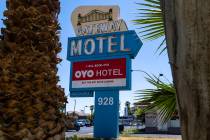Loan defaults, vacancy rates rising for commercial market
While everybody's talking about the battered housing market, there's a rumble growing about the other shoe that's about to fall.
Foreclosure problems that destroyed residential real estate in 2008 are set to hit the commercial real estate market even harder this year, analysts are warning.
Commercial property values have fallen 30 percent to 40 percent from their peak a couple of years ago and the market is fraught with peril. Loan defaults have soared. Financing has dried up. Rising vacancy rates combined with declining rents are weakening cash flow.
"For Lease" signs hang at almost every shopping center and office park around the Las Vegas Valley. Construction has been delayed or halted on some of the newer developments.
"The problem is banks and lenders were so loose in making construction loans," said Hank Gordon, principal of Laurich Properties, a retail developer in Las Vegas. "There was no need to build all these strip centers one after another along Rainbow (Boulevard), to pay $20, $30 and $40 a square foot for land and think rents will go up to warrant it and sucker a bank into making a construction loan when demand wasn't there."
Shopping centers that are overpriced and lack an anchor tenant to draw customers are the first to die when times get tough, Gordon said. National retailers are going out of business and smaller operators are chasing cheaper rent at other centers.
Commercial real estate loans will likely be the next big problem for banks, which hold about half of the estimated $3.5 trillion in commercial mortgage-backed securities, or debt backed by commercial property as collateral.
Delinquency rates on commercial loans jumped to 4.4 percent in the first quarter from 1.6 percent in the previous quarter, analysts at Keefe Bruyette & Woods, a New York-based investment bank, reported.
Nevada State Bank took back $1.86 million in vacant land from Indian Summer Development and Southwest USA Bank repossessed $1.25 million in storage facilities from Metro Development Group, an April report from Nevada Title Co. shows.
A slew of default notices has to be coming, said Bill Martin, chief executive officer of Service 1st Bank of Nevada.
"Borrowers -- good customers -- had planned on completing buildings as we continued through the construction cycle, and by that I mean buy land, zone it, develop, build and lease or sell," he said. "That's normal, sound lending. But the music stopped and depending on where we were in the process, we might have a borrower with land or a finished, empty building."
Some borrowers have "staying power" to pay interest, but few can make large principal reductions, let alone amortize them in monthly payments, Martin said. The impairment write-downs result from appraisals performed on an income basis.
"Empty building, no income, low appraisal ... if the loan is higher, write off the difference," he said.
Commercial loans are typically made on a shorter term and are rolled over at the end of the term into a new loan, said Michael Campbell, managing partner of Colliers International, a commercial real estate consulting company, in Las Vegas.
With financial institutions either unwilling or unable to roll those loans over and hesitant to rewrite them at lower rates, Las Vegas will probably see a wave of commercial foreclosures starting this year, Campbell said.
"This will put even more commercial space on an already saturated market," he said. "Investors remain scarce. Those who are not flush with cash are finding it difficult to get a loan, and those with cash are waiting for the market to hit bottom."
Retail delinquencies are rising at 20 to 30 basis points per month, according to the first-quarter 2009 Commercial Real Estate Outlook from Deutsche Bank. At 1.81 percent, total retail delinquency has surpassed its previous peak of 1.63 percent set in September 2002.
Deutsche Bank estimated that $15 billion in commercial mortgage-backed securities are maturing in 2009 and $30 billion are maturing in 2010. Amounts maturing through 2012 are moderate, but a high concentration of risky five-year, interest-only loans from 2005 to 2007 are on the way.
Prospects for retail are "particularly worrisome" given the historically large declines in consumer spending and increases in retailer bankruptcies, the report said.
"I don't disagree," said John Stewart, development director for Las Vegas-based Juliet Cos. "We've been concerned about that for some time. We've been fortunate. It's not all seashells and balloons. We've taken our hits."
Juliet recently completed the 725,000-square-foot second phase of Lake Mead Crossing in downtown Henderson. One of its national tenants, Sportsman's Warehouse, closed in April not because the store was underperforming or because of poor demographics, but as a casualty of the overall economy, Stewart said. The company's lender, GE Capital, pulled back on its line of credit.
"We're seeing that for a number of tenants," Stewart said. "That's the downside. On the positive, we're getting good reception from tenants because retailers are looking for quality. There's a flight to quality. Tenants are looking to go with (anchors) Target and Costco."
Juliet closed on a $35 million construction loan for its latest project, Green Valley Crossing, in June 2008 and is proceeding with development, Stewart said.
"The entire retail market is going through some great changes right now, not only locally but nationally," said Shelli Lowe, managing director of Integra Realty Resources in Las Vegas. "How it will all shake out, it's too soon to tell. We still have some stirring up before things are settled.
"One thing for sure," she added, "is this proves how truly interrelated all the markets are now, from the smallest town to the entire world."
Las Vegas commercial broker Steven Fink said the commercial market is in "big trouble" as witnessed by mall developer General Growth Properties filing for bankruptcy and Triple Five Development defaulting on a $27.6 million loan on vacant land for its proposed Great Mall of Las Vegas.
"From my perspective, all the deals that were purchased in 2006 and 2007 all had leverage with mezzanine loans, more leverage than we used to have," Fink said. "Commercial value is way down, in some cases to where there's little or no equity, so you can't refinance out of debt, hence bankruptcy."
There's a lot of "vulture money" waiting for property to lose value as soon as the bank files a notice of default, he said.
Retailers who built in the newer suburbs of Las Vegas during the boom years remain vulnerable to store closures as consumers curb spending, said broker Todd Manning of real estate investment services company Marcus & Millichap.
"Rooftops on the fringes of the city are seeing the highest foreclosures and high vacancy translates into lower sales figures for stores," he said.
Commercial real estate is headed for disaster when shopping centers depend on anchors such as Lego Village and Bass Pro Shops, said Patrick Dunne, professor emeritus of retail marketing at Texas Tech University.
"Malls are getting killed by empty anchors, Mervyns and places like that," Dunne said. "The trouble is nobody is offering financing for somebody else to come in, so you've just got vacant places. The other thing is the smaller tenant is being killed because anchors aren't pulling in traffic."
Gordon of Laurich Properties said banks will get stuck with a lot of commercial property and it may take some of them down. Investors won't be able to buy the property unless they have cash, he said.
"There aren't very many banks that will make commercial loans during these economic times," he said. "If someone forecloses on a shopping center, maybe, but if it's vacant land, I don't think the banks will talk to you."
Contact reporter Hubble Smith at hsmith@reviewjournal.com or 702-383-0491.
Source: Nevada Title Co.























